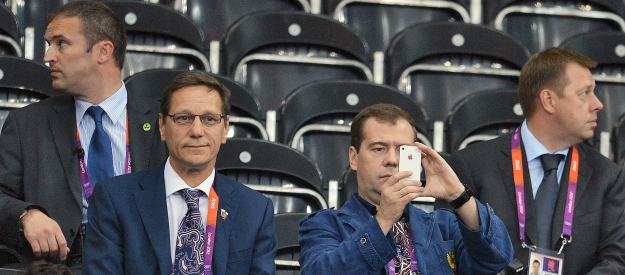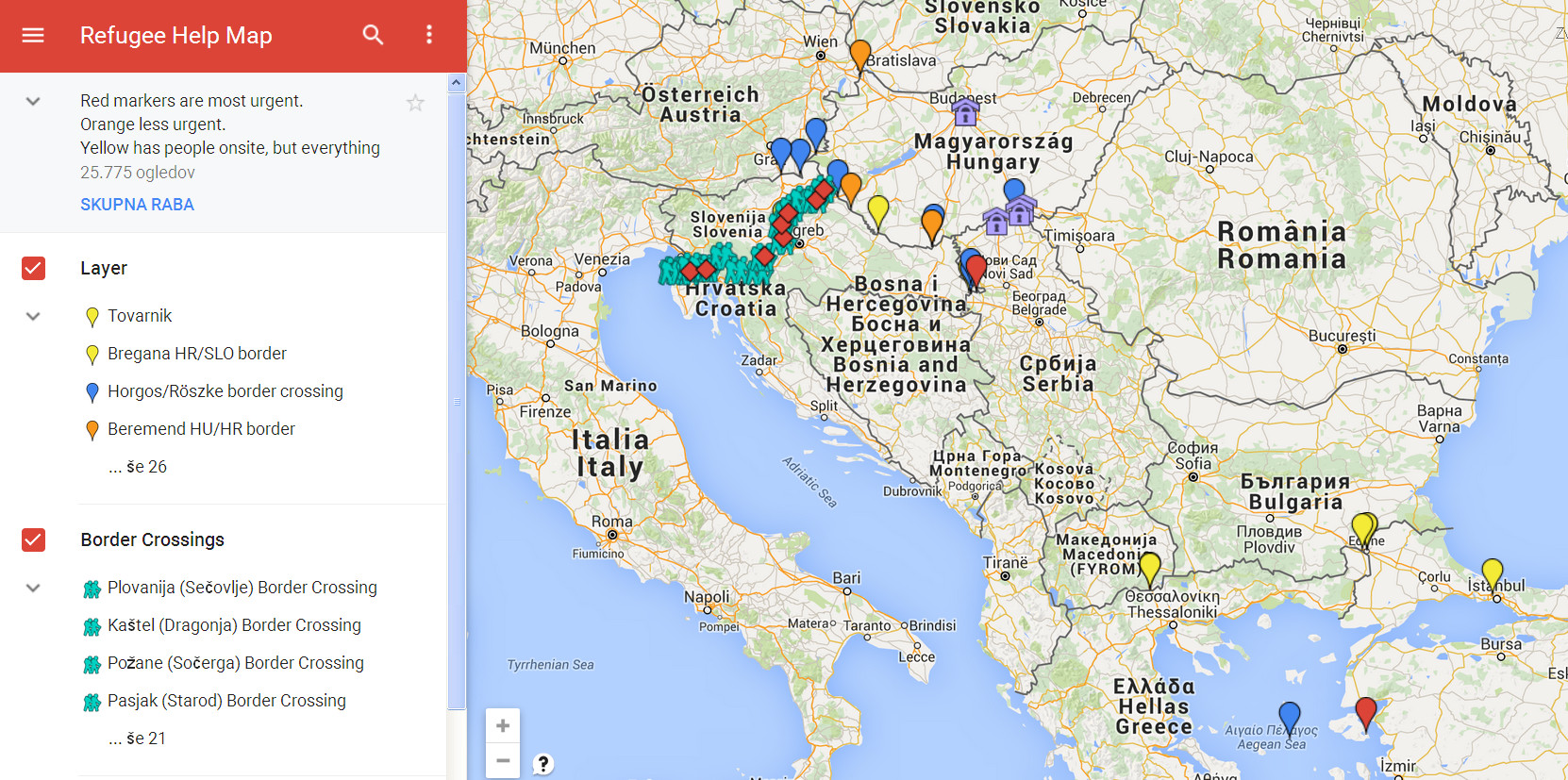The economic and political aspects of social media development reflect more general trends taking place in the world, generated by the logic of the network society.
Some Russian politicians know that social networks are a high-risk zone. President of the Russian Olympic Committee Alexander Zhukov, left, and Prime Minister Dmitry Medvedev at the volleyball match between Russia and UK. Source: Kommersant
Social trends and social networking became synonymous with Internet usage in 2013. Russia Direct sheds light on the role of social media as platforms for debate, protest and state surveillance in the new information world.
Changes in the market landscape of social media
While Facebook and Twitter remain the most popular social networks, Google+ is gaining prominence in 2013, and is second in monthly users after Facebook.
With the appearance of new market players, some companies are losing audience, such as Foursquare, because other social networks now offer integrated location services. With the amount of active Facebook users exceeding one billion the terms “Internet user” and “social media user” became synonymous. Social media companies offering interactive services such as text messaging, e-mail, photo sharing, social networking, and the like, are shaping users’ behavior, preferences and attitudes.
Most popular social media companies are U.S.-based and appear to promote U.S. values thereby producing suspicion among non-western governments.
Losing the right to be forgotten
There is a trend of increasing social networking through image-sharing and video-sharing rather than text, which spurs the huge growth and popularity of Instagram, Slideshare and Tumblr. Mobile usage of social media is also becoming significant.
These trends have evolved into a more unified communication, combining the possibilities of text, video and voice media. In this environment analytical data is rare, unpopular and ever harder to consume, which increases the role of social media in shaping the information preferences and social behavior of their users.
Another significant trend of 2013 dealt with the appeal of “the right to be forgotten,” or the ability to delete private or sensitive information from social media. This has led to the rise of Short Lived Social Networks. For example, Facebook supports the video- and image-sharing social network SnapChat where content vanishes seconds after being received.
Digital diplomacy is becoming popular among Russia’s officials. The Russian Foreign Ministry currently has around 70 official accounts on Twitter. Source: Kommersant
The rise of the niched network
LinkedIn, which is oriented toward creating social space for professional communication is the fourth largest network by the number of total users (after Facebook, Twitter and Google +). The growth of niched networks oriented towards target audiences or specific needs not met by social media giants is expected to continue.
In some areas the niched industry-oriented networks change the operating and governance modes. For example, networking is a tool in science and education management. The effectiveness of a university, both in Russia and abroad, is measured by the indexes reflecting the amount of publications and the number of citations.
Citations and peer reviews of research papers are indexed by bibliometric systems such as Scopus, Web of Science and Russian Index of Research Citation. These indexes and systems serve as platforms for interactive communication within the research community.
Local “sovereign” social networks surge
The total number of social media users is growing much faster in non-western countries located in the Asia-Pacific (including China, India, and Indonesia), Latin America, Middle East and Africa, than in Europe and North America.
Local “sovereign” networks, such as the SinaWeibo microblogging service in China or social network VKontakte in Russia, are becoming more popular in these countries then foreign networks. Generally this is the result of the state policy. As journalist and media researcher Bill Ristow points out, governments are suspicious towards U.S.-based social media companies and thus are getting more sophisticated in their approach to managing the Internet.
Rather than simply trying to block social media altogether, they allow some form of controlled access–and then use it as a way of monitoring citizen behavior.
Social media and social campaigns have given companies and governments access to unprecedented volumes of raw data about users. Until recently the problem has been the inability to analyze this data and turn them into information – and then to actionable policy. But new tools and applications make it possible to manage big data. For instance, social media command centers provide dedicated interfaces for tracking social statistics, everything from tweets and likes to customer sentiment.
Business is mostly interested in social media data management for advertising purposes, while politicians are more concerned about tracking political attitudes and governing mass behavior for political purposes.
The Social is now Political
Social media has become an essential factor of political life in many countries. Despite the disillusionment toward the outcomes of revolutions in the Internet age, which does not necessarily improve democracy, as the present events in Egypt show, social media has been widely used for coordination of mass political actions for nearly all of the world’s political movements, including “Euromaidan” protests in Ukraine in the winter 2013.
Ukranian protesters don’t give up. Photo: AFP / East News
As Clay Shirky in the article for Foreign Affairs points out, “social media have become a fact of life for civil society worldwide… With the tools provided by social media, which are based on the interactive model of instant information sharing … the networked population has more opportunities to engage in public speech, and an enhanced ability to undertake collective action.
Social media equals a threat to security
Social media is seen as a threat to national security in many countries. For example, in Russia the new document “Basics of the state Policy on the International Information Security till 2020” lists the possibility to interfere with the usage of information and communication for interference in the internal affairs of sovereign states, violation of public order, incitement of ethnic, racial and religious hatred, propaganda of racist and xenophobic ideas or theories that generate hatred and discrimination, incitement to violence. This implies the usage of social media in coordination of mass protests.
The same is true for many other countries; some of the governments even decide to block the access to U.S.-based social media (e.g. Iran and China). There are continuous attempts to introduce the idea of “sovereign internet” on the international level.
E-diplomacy or digital diplomacy remains a popular and effective diplomatic tool. Social media offers a way to talk to a target audience without the filter of the traditional media. Digital diplomacy was first used as a public diplomacy tool by the U.S. government, but in 2013 many other countries followed suit. At present more than 100 countries are carrying out e-diplomacy programs.
The Russian ministry of foreign affairs accelerated the pace of social media in the everyday diplomatic work of 2013. The Russian Foreign Ministry currently has around 70 official accounts on Twitter. The most popular (@MID_RF) is read by about 65,000 people.
The Foreign Policy Concept of the Russian Federation of 2013 states that “new information and communication technologies will be widely utilized” in order to “create an objective perception of Russia in the world” and “develop effective domestic means to exert informational influence on public opinion abroad.” In 2013 Russian e-diplomacy initiatives were developing at a very fast pace.
Reshaping U.S. digital diplomacy in light of Snowden
Former NSA contractor Edward Snowden. Photo: Reuters
Edward Snowden’s revelations regarding National Security Agency (NSA) surveillance practices were by far the most significant information security event of the year. These revelations undermine the claim of U.S. digital diplomacy to support Internet freedom aimed at open access to social media tools (such as the ability to use Wikipedia and Google inside Iran) as well as the freedom of ordinary citizens to produce their own content and to converse with one another (such as the Chinese citizens’ capacity to use text messaging without interference).
The Snowden affair showed that while pushing for Internet freedom the U.S. government collected private and sensitive information about social media and Internet users and wasn’t open enough itself. Digital corporations, including Apple, Facebook, Google, LinkedIn, Microsoft, Twitter and Yahoo! – wrote a collective letter to President Barack Obama and members of Congress, which called for reform of the NSA. According to them, the government should restrict the right of the security services to collect personal data and improve attractiveness of the NSA.






